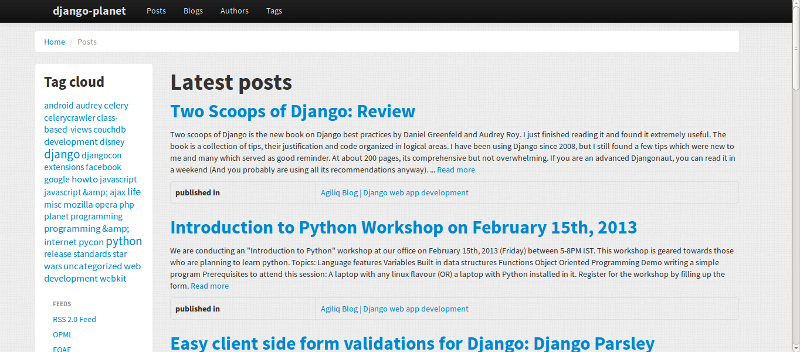Welcome to django-planet!¶

This is a generic application for Django that allows you to quickly build a planet aggregating RSS and ATOM feeds of your favorite blogs.
Some parts of this help docs has been copied from django-tastypie and then readapted to django-planet. Kudos to django-tastypie for its docs!
Getting Help¶
There are two primary ways of getting help. We have a mailing list hosted at Google (https://groups.google.com/forum/#!forum/django-planet) or you may contact us via email to matagus at gmail dot com. You may also open an issue in our github repository (it requires you to have a github account).
Requirements¶
django-planet requires the following modules but simply installing it using Pip will also install them. Just type:
pip install django-planet
Required¶
- Python 3.4+ or 2.7+
- Django 1.6 or 1.7 or 1.8
- django-tagging 0.3.6
- django-pagination 1.0.0+ for python 2.7 or django-pagination-py3 for python 3.5
- feedparser >= 5.0
- pinax-theme-bootstrap >= 3.0
- BeautifulSoup4 >= 4.0
Optionally, install celery if you want to add and update feeds using async & parallel tasks:
- Celery >= 3.0
- django-celery >= 3.0
Optional¶
- south (only required if you’re using Dajngo 1.6.x)
Why django-planet?¶
There are other feed aggregators out there for Django. You need to assess the options available and decide for yourself. That said, here are some common reasons for django-planet.
- You need to quickly create a blog aggregator website with a nice look & feel.
- You want a full website for browsing blog posts and its authors and tags, feeds and blogs.
- SEO matters to you: django-planet has templates with SEO metatags and it includes sitemaps so you may submit them to your favorite search engines.
- You want searching posts, blogs, tags and authors.
- You need to customize templates and have a rich set of template tags to do it.
- You want complete ATOM & RSS support
Running The Tests¶
The easiest way to get setup to run django-planet’s tests looks like:
$ git clone https://github.com/matagus/django-planet.git
$ cd django-planet
$ virtualenv env
$ . env/bin/activate
$ ./env/bin/pip install -U -r requirements.txt
$ ./env/bin/pip install -U mock django-discover-runner factory-boy tox
Then running the tests is as simple as:
# From the same directory as above:
$ tox
That will test django-planet using Python 2.7 combinated with Django 1.4, Django 1.5 and Django 1.6.